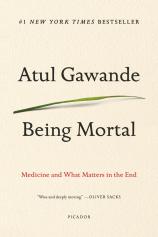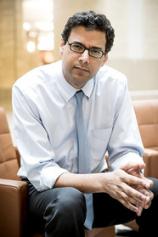Reading Group Guide
Discussion Questions
Being Mortal: Medicine and What Matters in the End

1. Why do we assume we will know how to empathize and comfort those in end-of-life stages? How prepared do you feel to do and say the right thing when that time comes for someone in your life?
2. What do you think the author means when he says that we’ve “medicalized mortality”? How does The Death of Ivan Ilyich illustrate the suffering that can result? Have you ever witnessed such suffering?
3. As a child, what did you observe about the aging process? How was mortality discussed in your family? How do your family’s lifespan stories compare to those in the book?
4. Have you ever seen anyone die? What was it like? How did the experience affect your wishes for the end of your own life?
5. What surprising facts did you discover about the physiology of aging? Did Dr. Gawande’s descriptions of the body’s natural transitions make you more or less determined to try to reverse the aging process?
6. Did you read Alice Hobson’s story as an inspiring one, or as a cautionary tale?
7. Do you know couples like Felix and Bella? The last days for Bella were so hard on Felix, but do you think he’d have had it any other way? Was there anything more others could have done for this couple?
8. Chapter 4 describes the birth of the assisted-living facility concept (Park Place), designed by Keren Wilson to provide her disabled mother, Jessie, with caregivers who would not restrict her freedom. Key components included having her own thermostat, her own schedule, her own furniture and a lock on the door. What does it mean to you to treat someone with serious infirmities as a person and not a patient?
9. What realities are captured in the story of Lou Sanders and his daughter, Shelley, regarding home care? What conflicts did Shelley face between her intentions and the practical needs of the family and herself? What does the book illustrate about the universal nature of this struggle in families around the globe?
10. Reading about Bill Thomas’s Eden Alternative in Chapter 5, what came to mind when he outlined the Three Plagues of nursing home existence: boredom, loneliness and helplessness? What do you think matters most when you envision eldercare?
11. How would you answer the question Gawande raises in Chapter 6 regarding Sara Monopoli’s final days: “What do we want Sara and her doctors to do now?”
12. The author writes, “It is not death that the very old tell me they fear. It is what happens short of death…” (55) What do you fear most about the end of life? How do you think your family would react if you told them, “I’m ready”? How do we strike a balance between fear and hope, while still confronting reality?
13. In Josiah Royce’s book, THE PHILOSOPHY OF LOYALTY, he explores the reasons why just food, safety, shelter, etc. provide an empty existence. He concludes that we all need a cause beyond ourselves. Do you agree? What are your causes? Do you find them changing as you get older?
14. Often medical treatments do not work. Yet our society seems to favor attempts to “fix” health problems, no matter the odds of their success. Dr. Gawande quotes statistics that show 25% of Medicare spending goes to the 5% of patients in the last stages of life. Why do you think it’s so difficult for doctors and/or families to refuse or curtail treatment? How should priorities be set?
15. What is your attitude, as you put it into practice, toward old age? Is it something to deny or avoid, or a stage of life to be honored? Do you think most people are in denial about their own aging?
16. Discuss the often-politicized end-of-life questions raised in the closing chapters of BEING MORTAL. If you had to make a choice for a loved one between ICU and hospice, what would you most want to know from them? Susan Block’s father said he’d be willing to go through a lot as long as he was able to still “eat chocolate ice cream and watch football on television.” What would you be willing to endure and what would you not be willing to endure for the possibility of more time?
17. As the author learns the limitations of being Dr. Informative, how did your perception of doctors and what you want from them change? What would you want from your doctor if you faced a serious illness?
18. Doctors, and probably the rest of us, tend to define themselves by their successes, not their failures. Is this true in your life? At work, in your family, at whatever skills you have? Should we define ourselves more by our failures? Do you know people who define themselves by their failures? (Are they fun to be with?) How can doctors, and the rest of us, strike a balance?
19. In Chapter 8, Dr. Gawande describes the choices made by his daughter’s piano teacher, Peg Bachelder. Her definition of a good day meant returning to teaching, culminating in two concerts performed by her students. If you were facing similar circumstances, what would your good day look like?
20. How was your reading affected by the book’s final scene, as Dr. Gawande fulfills his father’s wishes? How do tradition and spirituality influence your concept of what it means to be mortal?
Being Mortal: Medicine and What Matters in the End
- Publication Date: September 5, 2017
- Genres: Health, Medicine, Nonfiction, Social Sciences
- Paperback: 304 pages
- Publisher: Picador
- ISBN-10: 1250076226
- ISBN-13: 9781250076229








